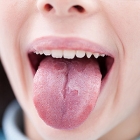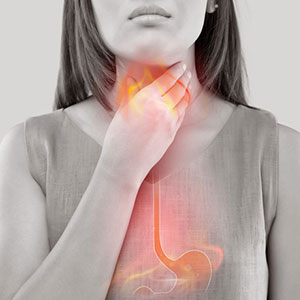Posts for tag: oral health

If you're intrigued by the strange and bizarre, here's one to pique your interest: geographic tongue. It's a rare condition that causes the appearance of red patches on the tongue surface, surrounded by grayish-white borders, and which look a lot like continents on a map (hence the name). But although it may look odd, geographic tongue won't harm your health.
The condition is also known as benign migratory glossitis, so named because it's not cancerous and the patches seem to move or “migrate” around the tongue surface. The most common causes are thought to be stress or hormonal disruptions in those predisposed to the condition. Many researchers believe zinc or vitamin B deficiencies in the body contribute to its occurrence. It also seems more prevalent among non-smokers and pregnant women, as well as occurring as a family trait.
The red patches are created by the temporary disappearance of some of the papillae, tiny bumps on the tongue's top surface. The patches can abruptly appear during a flareup and then disappear just as suddenly. But as “angry” as the patches may look, geographic tongue is not considered a health danger. It isn't normally painful, although people can experience stinging or numbing sensations emanating from the patches that can be mildly uncomfortable.
Because it's also rare, you're not likely to encounter it personally. But if you or a loved one does begin to notice red patches on the tongue, there are a few things you can do to lessen any accompanying irritation. For one, cut out foods like tomatoes, citrus fruits, eggplant, mint or highly spicy or acidic foods, all of which have been known to increase discomfort. You might also avoid astringents like alcohol or mouthwashes that likewise irritate the patches when they occur.
Although geographic tongue can't be cured, your dentist can help you manage symptoms when they arise with the help of prescribed anesthetic mouthwashes, antihistamines or steroid lozenges. These not only can help lower any discomfort or irritations, they may also lessen the duration of a flareup.
For the most part, geographic tongue usually causes more embarrassment than physical discomfort. But with a little help from your dentist, you can keep it to a minimum. Geographic tongue may be odd, but it's nothing to worry about.
If you would like more information on geographic tongue, please contact us or schedule an appointment for a consultation. You can also learn more about this topic by reading the Dear Doctor magazine article “Geographic Tongue: No Cause For Alarm.”

Heartburn is a big problem: Each year we Americans spend around $10 billion on antacid products, twice as much as for over-the-counter pain relievers. It's an even bigger problem because many indigestion sufferers actually have acid reflux or GERD (gastroesophageal reflux disease), a chronic disease that can cause physical harm—including to teeth.
That's why we've joined with other healthcare providers for GERD Awareness Week, November 17-23, to call attention to the causes and consequences of this disease. In addition to the harm it poses to the esophagus (the “tube” leading from the mouth to the stomach through which food passes), GERD could also damage your teeth to the point of losing them.
GERD is usually caused by the weakening of the lower esophageal sphincter, a ringed muscle located at the junction between the esophagus and the stomach. It acts as a “one-way valve” allowing food into the stomach, but not back into the esophagus. If it weakens, powerful stomach acid can come back into the esophagus and possibly even the mouth. The latter scenario poses a danger to teeth's protective layer of enamel.
Although tough and durable, enamel softens after prolonged contact with acid. Oral acid isn't all that unusual—acid levels typically rise right after eating, causing a temporary softening of enamel. Our saliva, however, goes to work to bring down those acid levels and stabilize enamel.
But if stomach acid enters the mouth because of GERD, the increased acidity can overwhelm saliva's ability to neutralize it. This can lead to enamel erosion, tooth decay and ultimately tooth loss. The enamel damage can be so pronounced that dentists are often the first to suspect GERD.
If you're diagnosed with GERD, here's what you can do to protect your teeth.
- Manage your GERD symptoms through medication, avoidance of spicy/acidic foods, alcohol, caffeine or tobacco products, and maintaining an optimum weight;
- Stimulate saliva by drinking more water, using saliva boosters, or (with your doctor's consent) changing from medications that may be restricting saliva flow;
- Speak with your dentist about strengthening your enamel with special toothpastes or mouthrinses containing extra fluoride or amorphous calcium phosphate (ACP).
You should also brush and floss daily to lower your risk of dental disease, but with one caveat: Don't brush your teeth during or immediately after a reflux episode, as you might remove microscopic bits of softened enamel. Instead, rinse your mouth with water mixed with a half-teaspoon of baking soda (an acid neutralizer) and wait about an hour to brush. The extra time also gives saliva time to further neutralize any remaining acid.
GERD can be unpleasant at best and highly destructive at worst. Don't let it ruin your teeth or your smile.
If you would like more information about GERD and dental health, please contact us or schedule a consultation. To learn more, read the Dear Doctor magazine articles “GERD and Oral Health” and “Dry Mouth.”

Thousands of years ago, our ancestors could only expect to live between 30 and 40 years. But steady improvements in lifestyle and medical care have increased human life expectancy to almost 80 years.
Although a welcome development, it does raise a question: Are our teeth up to the added years? Even though quite resilient, it's natural for teeth to wear after years and tens of thousands of meals biting and chewing.
Fortunately, there have also been phenomenal advances in dental restorations that can effectively replace teeth we lose along the way. Even so, the most advanced artificial replacements can't restore the full benefit of natural teeth to oral and general health. The ideal goal is to preserve and protect our natural teeth for as long as possible.
Here are 4 areas worthy of your attention in protecting your teeth throughout your lifetime.
Dental disease. Tooth decay and periodontal (gum) disease are the top causes for poor dental health and tooth loss. They're caused by bacteria living and feeding primarily in dental plaque, a thin biofilm on tooth surfaces. Brushing and flossing daily, along with regular dental cleanings, removes this disease-causing plaque. You should also seek treatment as soon as possible at the first sign of dental disease.
Bite correction. A poor bite is more than a smile problem: Teeth out of alignment and not engaging normally with their counterparts on the other jaw may increase tooth wear and make hygiene more difficult to perform. Orthodontic treatment, even if undertaken later in life, can help maintain your teeth's long-term health and longevity.
Bad habits. Your teeth are tough, but not indestructible. Protect them by avoiding harmful habits or practices like crunching ice, gnawing on pencils, nails or other hard objects, cracking open nuts or using your teeth as tools. Not engaging in these kinds of habits will help reduce wear and help you also avoid chipping and fractures.
Teeth grinding. Involuntarily clenching or grinding your teeth, often while sleeping, can accelerate dental wear. If you suspect you have this habit, take steps first to deal with stress, the number one cause of adult teeth grinding. Your dentist can also fashion a mouth guard that prevents your teeth from making solid contact with each other and thus help reduce wearing to your teeth.
If you would like more information on tooth wear, please contact us or schedule an appointment for a consultation. You can also learn more about this topic by reading the Dear Doctor magazine article “How and Why Teeth Wear.”

Officially, Labor Day honors the contributions of America's working men and women. Unofficially, the long holiday weekend in early September marks the end of the laid-back summer season. The day after, Americans snap back to the business, and busyness, of life. Post-Labor Day may also be an opportune time to revitalize another kind of business: taking care of your family's oral health.
Here are a few ways to refocus on healthier teeth and gums as you and yours return to regular work, school or household routines after this last summer holiday.
Make oral hygiene a daily thing. The single best thing anyone can do to maintain good dental health is to brush and floss every day. Diligently performing these tasks prevents the buildup of dental plaque, a thin bacterial film most responsible for dental disease. Twice-a-year dental cleanings round out routine dental care and help minimize your family's risk of tooth decay and gum disease.
Restrict sugar in your family's diet. Diets high in sugar increase the risk of tooth decay. That's because the oral bacteria that cause dental disease thrive on this popular carbohydrate. So, if your summer vacation included lots of sweet treats, tighten up your family's sugar intake to the equivalent (or less) of 6-9 teaspoonfuls per day. Instead, focus on foods rich in calcium and other tooth-strengthening nutrients.
Treat emerging dental problems. Even with the best hygiene and dietary practices, none of us is completely immune from dental disease. Regular dental visits should bring to light any threats brewing against your teeth and gums. In between, though, if you or a family member notices tooth pain, swollen or bleeding gums, or other abnormal signs in the mouth, don't put off getting checked. The sooner a dental problem is treated, the less teeth and gum damage—and treatment expense—it will cause.
Pursue a smile makeover. Do you or someone you love want a new smile? Or perhaps just a tweak to your current smile? There are amazing cosmetic dental techniques available, from simple teeth whitening to dental implants for missing teeth, that could completely transform your smile appearance. And don't let age discourage you: As long as a person is in reasonably good health with no prohibitive dental conditions, they can undergo most cosmetic procedures—including orthodontics—well into adulthood.
With vacations from work winding down and school gearing up, it takes no time at all to return to a hectic pace. Just be sure to carve out some time for optimizing oral health and appearance. Even a little effort can make a lifetime of difference.
If you would like more information on enhancing your dental health and smile appearance, please contact us or schedule a consultation.

We're all tempted occasionally to use our teeth in ways that might risk damage. Hopefully, though, you've never considered anything close to what singer, songwriter and now social media persona Jason Derulo recently tried in a TikTok video—attempting to eat corn on the cob spinning on a power drill. The end result seemed to be a couple of broken front teeth, although many of his followers suspected an elaborate prank.
Prank or not, subjecting your teeth to “motorized corn”—or a host of other less extreme actions or habits—is not a good thing, especially if you have veneers, crowns or other dental work. Although teeth can withstand a lot, they're not invincible.
Here, then, are four things you should do to help ensure your teeth stay healthy, functional and intact.
Clean your teeth daily. Strong teeth are healthy teeth, so you want to do all you can to prevent tooth decay or gum disease. Besides semi-annual dental cleanings, the most important thing you can do is to brush and floss your teeth daily. These hygiene tasks help remove dental plaque, a thin biofilm that is the biggest culprit in dental disease that could weaken teeth and make them more susceptible to injury.
Avoid biting on hard objects. Teeth's primary purpose is to break down food for digestion, not to break open nuts or perform similar tasks. You should also avoid habitual chewing on hard objects like pencils, nails or ice to relieve stress. And, you may need to be careful eating apples or other foods with hard surfaces if you have veneers or composite bonding on your teeth.
Wear a sports mouthguard. If you or a family member are regularly involved with sports like basketball, baseball/softball or football (even informally), you can protect your teeth from facial blows by wearing an athletic mouthguard. Although you can obtain a retail variety in most stores selling sporting goods, a custom-made guard by a dentist offers the best protection and comfort.
Visit your dentist regularly. As mentioned before, semi-annual dental cleanings help remove hidden plaque and tartar and further minimize your risk of disease. Regular dental visits also give us a chance to examine your mouth for any signs of decay or gum disease, and to check on your dental health overall. Optimizing your dental health plays a key part in preventing dental damage.
You should expect an unpleasant outcome involving your teeth with power tools. But a lot less could still damage them: To fully protect your dental health, be sure you practice daily oral care, avoid tooth contact with hard objects and wear a mouthguard for high-risk physical activities.
If you would like more information on caring for your cosmetic dental work, please contact us or schedule a consultation. To learn more, read the Dear Doctor magazine articles “Porcelain Veneers” and “An Introduction to Sports Injuries & Dentistry.”
